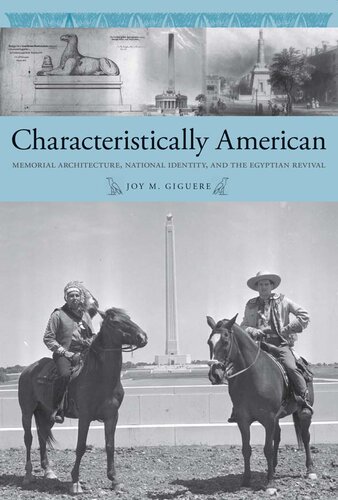(Ebook) Characteristically American: Memorial Architecture, National Identity, and the Egyptian Revival by Joy M. Giguere ISBN 9781621900399, 9781621900771, 1621900398, 1621900770, 2013039690
Prior to the nineteenth century, few Americans knew anything more of Egyptian culture than what could be gained from studying the biblical Exodus. Napoleon's invasion of Egypt at the end of the eighteenth century, however, initiated a cultural breakthrough for Americans as representations of Egyptian culture flooded western museums and publications, sparking a growing interest in all things Egyptian that was coined Egyptomania. As Egyptomania swept over the West, a relatively young America began assimilating Egyptian culture into its own national identity, creating a hybrid national heritage that would vastly affect the memorial landscape of the nineteenth and twentieth centuries. Far more than a study of Egyptian revivalism, this book examines the Egyptian style of commemoration from the rural cemetery to national obelisks to the Sphinx at Mount Auburn Cemetery. Giguere argues that Americans adopted Egyptian forms of commemoration as readily as other neoclassical styles such as Greek revivalism, noting that the American landscape is littered with monuments that define the Egyptian style's importance to American national identity. Of particular interest is perhaps America's greatest commemorative obelisk: the Washington Monument. Standing at 555 feet high and constructed entirely of stone—making it the tallest obelisk in the world—the Washington Monument represents the pinnacle of Egyptian architecture's influence on America's desire to memorialize its national heroes by employing monumental forms associated with solidity and timelessness. Construction on the monument began in 1848, but controversy over its design, which at one point included a Greek colonnade surrounding the obelisk, and the American Civil War halted construction until 1877. Interestingly, Americans saw the completion of the Washington Monument after the Civil War as a mending of the nation itself, melding Egyptian commemoration with the reconstruction of America. As the twentieth century saw the rise of additional commemorative obelisks, the Egyptian Revival became ensconced in American national identity. Egyptian-style architecture has been used as a form of commemoration in memorials for World War I and II, the civil rights movement, and even as recently as the 9/11 remembrances. Giguere places the Egyptian style in a historical context that demonstrates how Americans actively sought to forge a national identity reminiscent of Egyptian culture that has endured to the present day. Joy M. Giguere is an assistant professor of history at Penn State, York. She completed this book while working as an assistant professor at Ivy Tech Community College in Fort Wayne, Indiana. Her articles have appeared in the Journal of the Civil War Era and Markers: The Annual Journal of the Association for Gravestone Studies.
*Free conversion of into popular formats such as PDF, DOCX, DOC, AZW, EPUB, and MOBI after payment.


